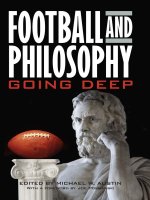university press of kentucky the philosophy of the x-files sep 2007
Bạn đang xem bản rút gọn của tài liệu. Xem và tải ngay bản đầy đủ của tài liệu tại đây (2.07 MB, 296 trang )
THE PHILOSOPHY OF
THE X-FILES
The Philosophy of Popular Culture
The books published in the Philosophy of Popular Culture series will illu-
minate and explore philosophical themes and ideas that occur in popular
culture. The goal of this series is to demonstrate how philosophical inquiry
has been reinvigorated by increased scholarly interest in the intersection of
popular culture and philosophy, as well as to explore through philosophical
analysis beloved modes of entertainment, such as movies, TV shows, and
music. Philosophical concepts will be made accessible to the general reader
through examples in popular culture. This series seeks to publish both es-
tablished and emerging scholars who will engage a major area of popular
culture for philosophical interpretation and examine the philosophical
underpinnings of its themes. Eschewing ephemeral trends of philosophi-
cal and cultural theory, authors will establish and elaborate on connections
between traditional philosophical ideas from important thinkers and the
ever-expanding world of popular culture.
SERIES EDITOR
Mark T. Conard, Marymount Manhattan College, NY
BOOKS IN THE SERIES
The Philosophy of The X-Files, edited by Dean A. Kowalski
The Philosophy of Stanley Kubrick, edited by Jerold J. Abrams
The Philosophy of Neo-Noir, edited by Mark T. Conard
The Philosophy of Martin Scorsese, edited by Mark T. Conard
The Philosophy of Science Fiction Film, edited by Steven M. Sanders
The Philosophy of TV Noir, edited by Stephen M. Sanders and Aeon J. Skoble
Basketball and Philosophy, edited by Jerry L. Walls and Gregory Bassham
THE PHILOSOPHY OF
THE X-FILES
Edited by Dean A. Kowalski
Foreword by William B. Davis
THE UNIVERSITY PRESS OF KENTUCKY
Publication of this volume was made possible in part by
a grant from the National Endowment for the Humanities.
Copyright © 2007 by The University Press of Kentucky
Scholarly publisher for the Commonwealth,
serving Bellarmine University, Berea College, Centre
College of Kentucky, Eastern Kentucky University,
The Filson Historical Society, Georgetown College,
Kentucky Historical Society, Kentucky State University,
Morehead State University, Murray State University,
Northern Kentucky University, Transylvania University,
University of Kentucky, University of Louisville,
and Western Kentucky University.
All rights reserved.
Editorial and Sales Offi ces: The University Press of Kentucky
663 South Limestone Street, Lexington, Kentucky 40508-4008
www.kentuckypress.com
11 10 09 08 07 5 4 3 2 1
Library of Congress Cataloging-in-Publication Data
The philosophy of the X-fi les / edited by Dean A. Kowalski ;
foreword by William B. Davis.
p. cm. — (The philosophy of popular culture)
Includes bibliographical references and index.
ISBN 978-0-8131-2454-4 (hardcover : alk. paper)
1. X-fi les (Television program)—Miscellanea. I. Kowalski,
Dean A.
PN1992.77.X22P45 2007
791.45'72—dc22 2007016757
This book is printed on acid-free recycled paper meeting
the requirements of the American National Standard
for Permanence in Paper for Printed Library Materials.
Manufactured in the United States of America.
Member of the Association of
American University Presses
Contents
Foreword vii
Preface xiii
Acknowledgments xix
Introduction: Mulder, Scully, Plato, Aristotle, and Dawkins 1
Dean A. Kowalski
Part I: The Credos
The Truth Is Out There: Abduction, Aliens, and Alienation 17
Mark C. E. Peterson
Freedom and Worldviews in The X-Files 37
V. Alan White
Postdemocratic Society and the Truth Out There 55
Richard Flannery and David Louzecky
Some Philosophical Refl ections on “Trust No One” 77
Richard M. Edwards and Dean A. Kowalski
“I Want to Believe”: William James and The X-Files 93
Keith Dromm
Part II: The Characters
Ancient X-Files: Mulder and Plato’s Sokratic Dialogues 111
William M. Schneider
Scully as Pragmatist Feminist: “truths” Are Out There 126
Erin McKenna
Moral Musings on a Cigarette Smoking Man 142
Timothy Dunn and Joseph J. Foy
Walter Skinner: The X-Files’ Unsung Hero 159
S. Evan Kreider
Science and the Mystery of Consciousness:
A Dialogue between Mulder and Scully 174
Gordon Barnes
Part III: The Episodes
“Clyde Bruckman’s Final Repose” Reprised 189
Dean A. Kowalski
Hope and Pessimism: The Two Tales of “Jose Chung” 209
Dean A. Kowalski and S. Evan Kreider
Feelings and Fictions: Exploring Emotion and Belief in
Fight the Future 232
Christopher R. Trogan
Appendix A: The X-Files Mythology 243
Appendix B: The X-Files Debriefed 247
Contributors 265
Index 269
vi Contents
Foreword
This book by its nature raises many questions, not least of which is why
an actor would be asked to write the foreword to a book of philosophy. An
even better question is, Why would an actor jump at the chance?
Well, this actor, while playing the Cigarette Smoking Man (“CSM” to
many) on The X - Files, puzzled over many questions raised by the show,
such as conspiracy theory, skepticism and credulity, aliens and the para-
normal, and the nature of evil itself. And this actor may be unique, given
his degree in philosophy and his reading of evolutionary biology and skep-
tical literature. This actor is also not in the least intimidated by celebrities
in his own fi eld but rather stands in awe of the giants of science and philos-
ophy, Richard Dawkins and Daniel Dennett in particular. How embarrass-
ing, then, that this actor starred in a series relentlessly attacked by Dawkins
himself.
I was always startled by the assumption of X - Files fans that since I was
acting in the series, I was obviously not only interested in the subject mat-
ter but also a believer in aliens, conspiracies, and the paranormal. I guess
viewers understand the life of an actor through interviews with A - list celeb-
rities. Those of us who work in the trenches take on acting roles because
we get them. The idea that we sit back and choose from a range of offers
is delightful to contemplate, but the reality is that we do the work we get.
Trust me, it was a sheer accident that I ended up doing this series for many
years. But once in the role, I had to deal with a range of fascinating issues
that included explaining to the shocked fan that, no, I don’t believe there
are aliens among us; I don’t believe in high - level government conspiracy;
and I certainly don’t believe in astrology, past lives, or telepathy.
Probably the most pervasive question I faced was, Why is the series so
popular? We were all asked this question, and we all had different answers
vii
depending on our angle of view. My response might have been the least
expected since I began with a related question: Why was Shakespeare so
popular? As a teacher of acting I had often lectured on Shakespeare. I have
argued that Shakespeare and his writings were unique because his genius
sat on the cusp of two worldviews and he drew inspiration from both.
Marshall McLuhan was another early intellectual hero of mine; I was pro-
foundly infl uenced by his argument that the printing press changed how
we see the world, not because of the content of printed works, but because
of exposure to the medium itself. In the decades following the invention of
the printing press in the late fi fteenth century, there were dramatic changes
in Western humans’ worldview. The medieval world included religiosity,
connectedness to the environment, lack of interest in self - identifi cation,
anonymous presentation of artistic works, and lack of interest in visual
perspective. The beginning of the modern world saw the decline of feudal-
ism, the separation of the individual, the beginnings of modern science
and the scientifi c method, and, soon, the stirrings of the Enlightenment.
Shakespeare’s brilliance stemmed, in part, from his intimate connection to
both worldviews.
What has this to do with The X - Files? Is it possible that the show strad-
dled a similar transition of worldview? The 1990s saw the full emergence
of computer use and the Internet, following an era of extensive television
viewing, and a corresponding decline in use of printed media. If McLuhan’s
thesis has validity, viewing media in pixels instead of print should have an
effect on the perspective and worldview of the user. To this observer at least,
it appeared that a major lack of trust in formerly respected authority devel-
oped. Books were either not read or, if they were, not trusted. At the same
time, there was an explosion of information in the ethereal cyberworld.
People no longer knew what or whom to believe. So a television series deal-
ing with those very issues of belief and authority struck a responsive chord.
What do we see moving forward into the twenty - fi rst century? Instead
of the rigorous application of science and reason to cope with this world of
uncertainty, we see a huge increase in superstition in general and religion
in particular, in North America at least. We see a major decline in human
rights and a reduction of complex problems to simple—unsuccessful—
solutions. In short, we see the end of the Enlightenment. Was The X - Files
a symptom and a harbinger of a world dangerously veering toward super-
stition and religion and away from reason and science?
What is the role of narrative in shaping our view of the world? To put
an evolutionary spin on the question, Who benefi ts from narrative and what
viii Foreword
kind of narrative? Unique in important ways, The X - Files is nonetheless
typical of popular narrative in our culture because it represents a battle
between Good and Evil—the latter being me, in case you were wondering.
Why is this the overwhelming narrative in popular culture, and what effect
does this narrative have?
Let’s imagine two different storytellers in two different hunter - gatherer
caves on opposite sides of a valley. One tells the story of the evil tribe on
the other side of the valley, of how we must work together to overcome our
adversaries and be willing to fi ght to the death to protect our people. The
other tells a story of human complexity, of how some humans are dan-
gerous but most are not, of how we should befriend strangers and open
our world to a range of possibilities. The next day the two tribes meet un-
expectedly in the valley as they each expand their hunting territory. Guess
what? The fi rst tribe wipes out the second while the second is still wonder-
ing if the fi rst tribe is friendly or not.
So who benefi ts? Certainly not the genes of the teller of complex stories
and his listeners. Those genes are gone. No, the genes that survive and go
on to replicate belong to the storytellers of the confl ict of good and evil.
In the environment in which humans evolved it may be that narrative in
general and this type of narrative in particular had real survival value.
Since we are still essentially the same species that we were as hunter -
gatherers, perhaps it is to be expected that we love these stories of good
and evil. We were selected to love them. But is this a good thing? In our
modern environment, does a reduction to good and evil help us? Or does
it give us Al - Qaeda and George Bush?
Whether there is really such a thing as Evil is beyond the scope of this
foreword. But an actor who tries to portray evil is in serious trouble. What
do you do? Grow a long moustache and twirl it a lot? As viewers and fans
of the show know, I took a different tack when assigned the role of the
antagonist who was referred to by Chris Carter himself as “the Devil.” I
decided I was the hero and Mulder was the bad guy. Of course as the CSM
I was ruthless and unfeeling, but to do what I believed had to be done, how
else could I be? Do the so - called evil men of history believe they are the de-
mons others make them out to be? Or are they often doing what they think
is right, however horrifi c that may seem to the rest of us? Put another way,
perhaps life is more complicated than a simple division of good and evil.
But what of the other major aspect of the series, its emphasis on the
paranormal? What is an actor with a degree in philosophy to make of that?
The simple reply to the astonished fan when I confessed my nonbelief in,
Foreword ix
say, aliens was that the burden of proof was on them, the believers, not
on me, the skeptic. Since, naturally, the believers were never satisfi ed with
this reply, I determined to investigate further. Eventually I stumbled on
CSICOP—the Committee for the Scientifi c Investigation of Claims of the
Paranormal—and discovered that most paranormal claims had been sub-
jected to rigorous research—and found wanting.
Among the many prominent scientists on the masthead of CSICOP
was Richard Dawkins, who had transformed my intellectual life years
earlier when I read The Selfi sh Gene. He was also an outspoken critic of
The X - Files, claiming that it undermined rational thought and promoted
pseudo science. How could I continue to work on a show that so apparently
betrayed my own beliefs? Was it enough for me to say, “Well, it’s just fi ction
after all”?
Here is what Dawkins said in the 1996 Dimbleby Lecture:
A fair defence, you might think. But soap operas, cop series and
the like are justly criticised if, week after week, they ram home the
same prejudice or bias. Each week The X - Files poses a mystery and
offers two rival kinds of explanation, the rational theory and the
paranormal theory. And, week after week, the rational explanation
loses. But it is only fi ction, a bit of fun, why get so hot under the
collar?
Imagine a crime series in which, every week, there is a white
suspect and a black suspect. And every week, lo and behold, the
black one turns out to have done it. Unpardonable, of course. And
my point is that you could not defend it by saying: ‘But it’s only
fi ction, only entertainment.’
As I have said, I am a great admirer of Dawkins, but is it possible his re-
sponse to our show has been rather quick and glib? Proponent of science
that he is, he has offered no scientifi c evidence that the show actually infl u-
ences the way people think about the paranormal. Two kinds of studies
spring readily to mind. One could survey X - Files viewers and a control
group to see if paranormal belief is more common among X - Files viewers.
Or one could do laboratory studies, showing one group episodes of X - Files
and another group Animal Planet and studying the comparative effects
on paranormal belief. My own straw polls of college groups when I used
to lecture at American universities suggested a level of paranormal belief
x Foreword
among fans similar to that in the general population. Not very scientifi c, I
admit, but more than Dawkins has offered.
Furthermore, Dawkins’s analogy of the black and white criminals may
not hold up under closer scrutiny. After all, for each week’s mystery, a solu-
tion was proposed by a woman and another by a man. And, “lo and be-
hold,” each week the man’s solution triumphed. If the show is insidiously
presenting a bias under the guise of fi ction, why were the feminists not up
in arms?
Is my challenge to Dawkins valid? Or like the Cigarette Smoking Man
himself am I manipulating reason to justify my own actions, in this case,
continuing to perform in such a successful series?
Being involved in The X - Files was a wild and wonderful journey. To be
involved in the publication of this book was yet another unexpected plea-
sure. The questions raised by the phenomenon of The X - Files continue to
reverberate.
William B. Davis
Vancouver, Canada
Foreword xi
This page intentionally left blank
Preface
xiii
This volume explores philosophically signifi cant connections to The X - Files
around three rallying points. Each point is given its own section. The fi rst
section is “The Credos.” It explores the philosophical signifi cance of the
show’s three primary slogans: “The truth is out there,” “Trust no one,” and
“I want to believe.” The second section is “The Characters.” It provides
philosophically interesting character studies of Fox Mulder (David Du-
chovny), Dana Scully (Gillian Anderson), the Cigarette Smoking Man
(CSM, played by none other than William B. Davis), and Assistant Direc-
tor Walter Skinner (Mitch Pileggi). The third section is “The Episodes.”
Here you will fi nd discussions of philosophical issues raised by “Clyde
Bruckman’s Final Repose,” “Jose Chung’s ‘From Outer Space,’” and Fight
the Future, respectively.
Each section contains chapters written by scholar - teachers who appre-
ciate The X - Files almost as much as you do (and, in Professor Foy’s case,
perhaps more). Within each chapter, you’ll fi nd the contributing authors
discussing philosophical issues in metaphysics (the study of ultimate re-
ality), epistemology (the study of knowledge), ethics (the study of right
living) and axiology (the study of value, of which ethics is one facet), aes-
thetics (the study of art and beauty), political philosophy, feminism, and
existentialism, among others. Because we are teachers as well as scholars,
each chapter is written for those new to philosophy; thus, the discussions
(as a rule) presuppose very little prior background in philosophy.
The fi rst section contains fi ve chapters. Mark Peterson begins the vol-
ume with “The Truth Is Out There: Abduction, Aliens, and Alienation,”
in which he distinguishes three kinds of inferences: deductive, inductive,
and abductive. With the help of Charles Sanders Peirce, Peterson argues
that Mulder’s talent for solving “unexplained phenomena” is grounded
in his profi ciencies in abduction. Scully, an able investigator in her own
right, regularly relies on induction. Peterson further argues that Mulder’s
approach can be benefi cial to fl edgling and professional philosophers alike.
In “Freedom and Worldviews in The X - Files,” Alan White explores the
issue of freedom and determinism. After providing the reader important
background on this classic debate, he sets his sights on how Mulder’s and
Scully’s views of things started to merge as the series progressed. There
is an important link to the fi rst chapter in this regard: Peterson argued
that we should become more like Mulder. As we saw with Scully, this takes
some effort. However, White is skeptical of the claim that there is any sig-
nifi cant sense in which we are free to change worldviews on the basis of
discovered truth, despite what Peterson and The X - Files itself seemingly
imply. In “Postdemocratic Society and the Truth Out There,” Professors
Louzecky and Flannery strive to show the contemporary political rele-
vance of The X - Files. They begin by articulating the necessary conditions
for sound demo cratic government and argue that the kind of secretive po-
litical tactics employed by the Syndicate are necessarily inconsistent with
democracy exactly because they undermine publicity and informed deci-
sion making. They then go on to use Mulder and Scully as models for how
governmental agencies like the Syndicate—be they fi ctional or real—can
be marginalized. “Some Philosophical Refl ections on ‘Trust No One’” be-
gins exploring the “Trust no one” credo by reminding the reader of the
episode that launched it: “The Erlenmeyer Flask.” Richard Edwards and
I discuss two different philosophical theories that support Deep Throat’s
charge, albeit in two very different ways. First, if Thomas Kuhn’s “para-
digm view” of science is correct, then it seems that the scientifi c commu-
nity plays a surprisingly large role in shaping which data are accepted and
which are rejected. This poses problems for Scully’s strict reliance on scien-
tifi c inquiry to debunk or uphold the veracity of Mulder’s work. Can Scully
trust herself as a scientist? Second, if psychological egoism is true, then all
human persons are naturally selfi sh; if so, then we cannot trust others to
ever act on our behalf (except, perhaps, when our interests coincide). In
the fi nal chapter in this section, “‘I Want to Believe’: William James and
The X - Files,” Keith Dromm uses The X - Files to compare and contrast the
ideas of William James and W. K. Clifford. Dromm argues that Mulder’s
approach to belief has much in common with the ideas expressed by Wil-
liam James in his essay “The Will to Believe,” while Scully has affi nities with
the thought of W. K. Clifford as expressed in “The Ethics of Belief.” How-
ever, Dromm continues, Walter Skinner more nearly personifi es the views
xiv Preface
in James’s later work Pragmatism. Dromm then concludes by arguing that,
of the three models of belief acquisition, the Skinner model is preferable.
The second section also contains fi ve chapters. William Schneider’s
chapter, “Ancient X - Files: Mulder and Plato’s Sokratic Dialogues,” is an
innovative attempt at drawing parallels between Mulder and Socrates re-
garding the latter’s charge to “know thyself.” In a literary fashion similar to
Descartes’s Meditations, Schneider leads the reader into an introspective
soliloquy on Mulder’s motivations and convictions regarding his search for
the truth. In “Scully as Pragmatic Feminist: ‘truths’ Are Out There,” Erin
McKenna focuses on the well - known intellectual shift in the Dana Scully
character. At fi rst, Scully is the hardheaded scientist. However, McKenna
argues that the season 7 episode “all things” solidifi es crucial changes in
how Scully sees herself and understands the world around her. This, in
turn, facilitates a discussion of contemporary philosophical ideas associated
with feminism and pragmatism. Professors Joseph Foy and Timothy Dunn
delve deep into the Cigarette Smoking Man character in “Moral Musings
on a Cigarette Smoking Man.” They utilize core principles and theories
of moral philosophy to explore and assess two common interpretations
of the one who must “take the elevator up to work” (as Skinner would
say). By drawing on many examples from the series, they conclude that
both interpretations are inadequate. Undaunted, they boldly argue that the
CSM is no ordinary villain but represents a particularly perverse inversion
of the moral order and as such fundamentally challenges traditional mo-
rality. In this way, through his “transvaluation of power,” the CSM charac-
ter teaches us a deeper lesson about classical images and understandings of
evil. “Walter Skinner: The X - Files’ Unsung Hero” has Evan Kreider present
Assistant Director Skinner as a paradigm for understanding Aristotelian
and Platonic interpretations of virtue and, in this way, redemonstrates the
relevance of ancient Greek virtue ethics for contemporary society. Inter-
estingly, Kreider does not argue that Skinner is the epitome of a virtuous
person, due to a recurring character fl aw; however, that fl aw makes him
very human, which might explain why so many can identify with his char-
acter. The last chapter of this section is also something of a throwback
to ancient Greek philosophy, at least in terms of its presentation. Plato’s
dialogues are renowned, but very few contemporary philosophers choose
to present their material in this form. For our benefi t, Gordon Barnes has
crafted in “Science and the Mystery of Consciousness” a lively dialogue
between Mulder and Scully taking place near the end of season 1, mere
hours before the events in “The Erlenmeyer Flask.” Our heroes debate the
Preface xv
classic philosophical question of whether human persons are nothing over
and above their physical bodies. As you might expect, Mulder attempts to
argue that, given undeniable facets of human consciousness, persons are
not merely the sum total of their physical parts, but Scully is resistant to
this idea.
The third and last section presents three episodes (two penned by
Darin Morgan) in the order in which they aired (or premiered). “‘Clyde
Bruckman’s Final Repose’ Reprised” is an analysis of the character played
admirably by Peter Boyle. Bruckman possesses the ability to divine the fu-
ture, raising the classic triad of issues about freedom, fate, and foreknowl-
edge. I argue that philosophical concerns associated with these three issues
can be abated so long as we remember that our choices explain what is
ante cedently true and known about us and not vice versa. I further argue
that if Bruckman could have somehow known and internalized this dis-
tinction, his ultimate suicide could have been avoided. In “Hope and Pes-
simism: The Two Tales of ‘Jose Chung,’” Evan Kreider and I team up to
bravely offer an interpretation of the wild and wildly popular episode
“Jose Chung’s ‘From Outer Space.’” (You know, the one with Alex Trebek.)
Two interpretations initially present themselves: Morgan, in a tribute to
Rashomon, is implicitly attempting to convey the idea that there is no such
thing as objective truth (anywhere); alternatively, Morgan more modestly
proposes that objective truth in one of its alleged modes can’t be had. Due
to the episode’s existentialist undertones, made explicit at its denouement,
of “We are all alone,” we argue that Morgan only requires the latter inter-
pretation. We therefore argue that Morgan’s screenplay lends credence to
what we call “axiological anti - realism,” and then we attempt to show how
this might lead one to adopt existentialism. We conclude by critiquing two
popular philosophical arguments for axiological anti - realism in the hope
of countering Morgan’s pessimistic tone at the end of the episode. Finally,
in “Feelings and Fictions: Exploring Emotion and Belief in Fight the Fu-
ture,” Chris Trogan explores the aesthetic content and value of Fight the
Future. His primary goal is to articulate and assess the paradoxical set of
beliefs that it is reasonable to identify and empathize with fi ctional char-
acters like Mulder and Scully but unreasonable to identify and empathize
with your friend’s story that his mother recently died when you discover
that she is very much alive. Trogan also argues that his preferred resolution
to this issue has benefi cial ramifi cations for imaginative moral reasoning
and character development.
xvi Preface
The book concludes with two appendixes. The fi rst, written by Joseph
Foy, is a synopsis of the main story line mythology running through The
X - Files. Professor Foy reminds us of the intricacies of the Syndicate, the black
oil, and pending alien colonization. The second is an episode - by - episode
synopsis through Fight the Future. (Because of this, only post–season 5
episodes that are directly referred to in the text are listed by season.) In
addi tion to listing story code, episode author and director, and a brief plot
summary, I alert the reader to relevant philosophical issues the episode
conveys. I also direct the reader to chapters that heavily rely on ideas or
plot devices from the episode in question.
This volume focuses (although not exclusively) on the fi rst fi ve years
of the series, including the 1998 feature - length fi lm Fight the Future. This
should not be interpreted as my bias that the show simply wasn’t the same
after Fight the Future was released. While I am a bit partial to the episodes
in seasons 3 and 4, I am not a staunch advocate of this idea of the show’s
decline; however, I respectfully acknowledge that some fans of the show be-
came disillusioned near the end of season 6. Rather, this choice was forced
upon me by time and book - length constraints. There is simply too much
quality philosophical content to fi t into one book. I therefore decided to
focus now on seasons 1 through 5 and pray (perhaps with the help of “The
Blessing Way”’s Albert Hosteen and the Navajo “holy people”) that I’ll have
a chance in the future to put together a book on seasons 6 through 9.
Preface xvii
This page intentionally left blank
Acknowledgments
I must begin by thanking William B. Davis for kindly agreeing to write the
foreword. By the time I gathered enough courage to contact him, it was
well into the project, not leaving him a great deal of time to share his per-
ceptive insights and erudition with you. Henceforth, when my students ask
me what they can do with a philosophy major, I will tell them that they
can become a world - class actor and champion water - skier and make their
philosophy professors proud by one day leading the examined life.
I am, of course, indebted to Mark Conard, Steve Wrinn, and Anne Dean
Watkins at the University Press of Kentucky. They were incredibly helpful
and supportive in preparing the manuscript and bringing the book to frui-
tion. A debt of gratitude is also owed to Cheryl Hoffman; her subtle but
skilled editorial hand has made the manuscript immeasurably more read-
able. I am grateful to the many “X - Philes” who tirelessly have kept their
Web sites active and up to date, but three sites deserve particular men-
tion. First, you can fi nd the script of each episode of The X - Files on Clive
Banks’s site, ; this was a proverbial godsend in quot-
ing dialogue. Second, you can fi nd voluminous X - Files episode reviews on
Sarah Stegall’s site, ; I found her ideas stimu-
lating, especially on “Clyde Bruckman’s Final Repose” and “Jose Chung’s
‘From Outer Space.’” Finally, you can fi nd summaries of each episode of
The X - Files at http://xfi les.wearehere.net/xfi les.htm; these were an invalu-
able resource to me in crafting my own episode summaries. Without their
knowing it, their work made my job of editing the book much easier. While
I am grateful for the efforts of all my colleagues and contributing authors,
I owe tremendous debts of thanks to Professors Evan Kreider and Joe Foy.
The former helped me, at the last minute, craft a quality essay on some
rather diffi cult material. The latter was a constant source of enthusiastic
xix
support; without his efforts (not the least of which was his boyish, ear -
to - ear grin, which would come over his face every time we discussed the
project), this book might not have made it to print. Finally, I am also very
appreciative of my University of Wisconsin–Waukesha students—the
“phledgling philosophers”—during the fall semester of 2006. They were
incredibly patient and supportive as I fi nished the manuscript.
But each and every good thing that I have achieved in the last ten years
I owe to my wife. Despite myself, she remains steadfast, reminding me of
what is truly important. In fact, the only actual unexplained phenomenon
is why she chose me in the fi rst place. But perhaps it is as “Humbug”’s Dr.
Blockhead believes: some mysteries are not meant to be explained, merely
marveled at and appreciated for what they are. In a very clumsy attempt to
show my loving appreciation, I dedicate this book to her:
For Patricia—
“Then We Believe the Same Thing”
xx Acknowledgments
1
Introduction
Mulder, Scully, Plato, Aristotle, and Dawkins
Dean A. Kowalski
That The X - Files is such a natural choice for a book like this is not for the
reason you might initially think. It’s not that it was “metaphysical” in the
sense that it was about extraterrestrials and various otherworldly topics
that no one could ever really prove true or false. This reminds me of all
the times I would fi nd a new bookstore, eagerly throw the doors open, and
march straight back to its Metaphysics section, merely to be dis appointed—
again—at fi nding only volumes on the healing power of white crystals and
how - to books about tarot card reading (once, I swear, with the faces of Stu
Charno and Alex Diakun on the cover).
Rather, the very premise of the show incessantly reminded you (and
once in Navajo) that “the truth was out there,” and then every week be-
guiled you to fi nd it. Yes, sometimes the truth pursued was about con-
scious black oil and shape - shifting aliens. But the deeper point remains: we
were to search for the truth and were determined to fi nd it, even though
we didn’t have all the information or all the tools to unearth it that we’d
like. This is exactly the mind - set of the philosopher.
Furthermore, the show’s two heroes represent two fundamental but
disparate search methods. Special Agent Dana Scully (Gillian Anderson),
a trained medical doctor who also studied physics in college, is the con-
summate scientist. The default starting position for her search is to set a
naturalistic and empirical course. Her partner, Special Agent Fox Mulder
(David Duchovny), also possesses an impressive educational pedigree. He
is an Oxford - educated psychologist and an intuitively gifted FBI profi ler.
In fact, he is considered one of the best analysts ever assigned to the Violent
Crimes Division. However, his methods are anything but conventional. Be-
cause his interests invariably involve “unexplained phenomena,” he often
sets methodological courses for “extreme possibilities” that transcend
2 Dean A. Kowalski
conventional scientifi c wisdom. Yet, Mulder and Scully invariably engage
in respectful, honest dialogue. They regularly insist on substantiating their
approaches and hypotheses with evidence (broadly conceived) and logical
rigor, all in hopes of locating the truth “out there” that continually eludes
them. This, again, is a staple of quality philosophical inquiry.
The School of Athens Analogy
I would like to say—and, dare I say, want to believe—that the divergent
approaches embodied in the characters of Dana Scully and Fox Mulder are
a bit analogous to those of two giants from the history of philosophy: Plato
and Aristotle. I suspect that many of my professionally trained colleagues
will scoff at this purported analogy and accuse me of speaking tongue in
cheek. But allow me to explain.
There is a famous painting by Raphael called The School of Athens.
The two focal points are Plato and his star pupil, Aristotle. Curiously, the
two philosophers are looking at each other, with Plato pointing to the sky
and Aristotle with his arm stretched out horizontally, palm facing down
in a cautionary manner. It is widely believed that Raphael was attempt-
ing to capture the basic philosophical difference between the two greats:
Plato believed that one must reach a nonearthly plane in order to unlock
the deepest secrets of truth and knowledge—his “realm of the forms”—
but Aristotle believed that truth and knowledge can be obtained through
carefully constructed hypotheses grounded in astute observations of our
earthly surroundings. Aristotle, then, is cautioning his teacher not to (liter-
ally) overlook or underappreciate that which is directly in front of him.
Mulder and Scully are just a bit like that. Mulder is insistent that a com-
plete explanation for what he often experiences must include an unearthly
source. If we stay at the conventional level of straightforward empiricism,
our account of things will forever remain incomplete. Is Mulder too quick
in searching the heavens? Is he irrational in doing so? Perhaps Mulder’s
methodology has been shaped by nonrational elements; it seems conceiv-
able that his witnessing his sister’s alleged alien abduction and his father’s
involvement in some of the early X - Files somehow help to explain Mulder’s
psychological penchant for looking skyward. But this doesn’t necessarily
mean that Mulder is irrational. After all, similar nonrational explanations
have also been offered for Plato’s proclivities to look toward an unearthly
realm, specifi cally his early involvement with Pythagorean mathematics
and the psychological effects of witnessing his teacher’s “abduction” by the
Introduction 3
Athenian court. These facts might drive Plato to believe that “the truth is
out there”; in this way it is beyond the seditious grip of the Sophists, or the
untrained Athenian assembly. Scully embodies Aristotle’s warning about
keeping oneself grounded. Both see the value of empirical study and rigor-
ous scientifi c testing. The sort of ideal explanations that Plato and Mulder
seek are, at best, unwarranted or simply cannot be had, and, at worst, they
are merely whims of fancy.
Contemporary philosopher Norman Melchert seems to confi rm the
developing analogy in this way: “Two quite different intellectual styles are
exemplifi ed by Plato and Aristotle. Plato is a man with one big problem, one
passion, one concern; everything he touches is transformed by that con-
cern. Aristotle has many smaller problems. These are not unrelated to each
other, and there is a pattern in his treatment of them all.”
1
I don’t know
whether series creator Chris Carter had Plato and Aristotle in mind when
originally crafting his protagonists—I doubt it—but Melchert seems to
be equally describing Mulder and Scully. Melchert continues, “One feels
in Plato a profound dissatisfaction with the familiar world of sense
Plato is a combination of rationalist and mystic.” For Aristotle, however,
“truth concerns the sensible world, and our knowledge of it begins with
actually seeing, touching, and hearing the things of the world. The senses,
although not suffi cient in themselves to lead us to knowledge, are the only
reasonable avenues along which to pursue knowledge.”
2
Everyone is clear
that Scully, especially early in the series, is true to Melchert’s description of
Aris totle; however, some often overlook the fact that Mulder can be under-
stood as a combination of rationalist and mystic.
3
Just as there are disagreements in the ivory tower of academia about
whether Plato’s approach to fi nding the truth is more effective than Aris-
totle’s, we in the “marketplace” of popular culture can ask the same
question about Mulder’s and Scully’s. Moreover, just as few philosophers
anymore are strictly Platonists or strictly Aristotelians, we can also ask how
the methods of Mulder and Scully might be benefi cially combined. Might
doing so give us a better picture of how the world “out there” really is?
With a hybrid approach might we be able to answer some questions that
we couldn’t answer otherwise? If so, which? If not, why not? Questions like
these, it seems to me, begin to capture the inherent philosophical signifi -
cance of The X - Files at the most foundational level. And such questions
are not idle. Some philosophers believe that, even with all the scientifi c
data we have amassed about human beings, an adequate account of what
persons are as conscious beings must go beyond the physical facts about
4 Dean A. Kowalski
us. Other philosophers reason that if we are free and responsible for our
choices and actions, as our experiences seem to indicate, then it cannot be
that we are merely the sum total of our physical parts. Therefore, without
disparaging or discounting the importance of Scully’s trust in quality sci-
entifi c research, it seems that we might do well to follow Mulder’s lead (or
something like it) in articulating a complete account of how things are.
Nevertheless, the School of Athens analogy cannot be pushed too far. It
begins to break down as soon as we remember that Mulder and Scully are
television characters and not philosophers. Moreover, Plato offered astute
philosophical arguments why his realm of the forms must exist; he was
not merely driven by nonrational, psychological factors in seeking the un-
earthly explanation, as, arguably, Mulder initially was. So, why press the
analogy at all? Paradoxically, it’s useful because it fails in other, more in-
structive, ways. When Raphael depicts Plato pointing to the sky, Plato is not
literally pointing up to some extraterrestrial plane, even if Mulder might
be. The unearthly plane Plato seeks is not some distant planet but an ab-
straction. While Mulder might countenance the idea that all of his earthly
experiences are ultimately explained by ancient visitors from a different
solar system, Plato would stress that his realm of the forms exists no-
where in physical space but yet “contains” all the unchanging truths and
concepts that literally explain everything we experience (and even some
things we don’t). Therefore, Plato is the only nonnaturalist in this regard.
Moreover, Mulder isn’t a straightforward supernaturalist either. He is more
suspicious of the dogmatism of organized religion than of Aristotelian at-
tempts to capture the truth. Rather, Mulder’s default position (especially
once the character is established) seems to be that Scully’s naturalism often
isn’t inclusive enough. If aliens exist and if they somehow account for life
on this planet, then Scully’s stockpile of current scientifi c wisdom must
be revised and expanded. Thus Mulder isn’t antiscience (even if he some-
times comes off that way) so much as he is skeptical of how science rules
out some phenomena by fi at merely because they don’t accord with what
scientists currently know.
The basic point of Mulder’s character in this regard is that we should
be open to exploring “unexplained phenomena” via “extreme possibilities,”
especially if no other, more conventional scientifi c approach seems viable.
This doesn’t mean that they always warrant such treatment. After all, in
“Beyond the Sea” Mulder himself tells Scully, “Dana, open yourself up
to extreme possibilities only when they’re the truth.” However, to rule out
these possibilities simply by fi at runs the danger of trapping oneself in a









